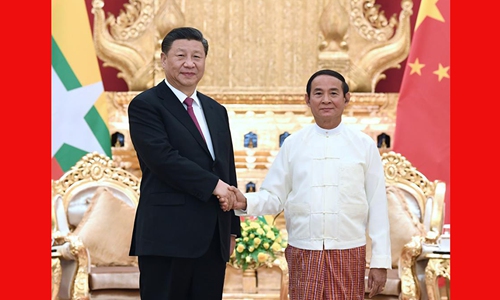Xi Jinping’s long-awaited visit, the first from a Chinese head of state in 19 years, ended with dozens of new deals as Myanmar deepens its economic relationship with its most powerful neighbor.
Over the two-day conference, Xi met with President U Win Myint, State Counsellor Daw Aung San Suu Kyi and Commander-in-Chief Senior General Min Aung Hlaing. The 33 new deals included liquid natural gas imports, urban development, new rail lines and the USD 1.3 billion Kyaukhphyu deep-sea port and economic zone. The agreements were designed to advance the China-Myanmar Economic Corridor (CMEC), which is an integral piece of China’s ambitious Belt and Road Initiative. The CMEC calls for new roads, railways, ports, trade zones and other infrastructure, especially in Myanmar’s north.
“It goes without saying that a neighboring country has no other choice, but to stand together till the end of the world,” AFP quoted Daw Aung San Suu Kyi as saying.
Some critics are wary of China’s growing economic influence. Minority political parties and ethnic armed organizations, in particular, fear China tipping the scales of Myanmar politics. On Saturday, demonstrators gathered in Yangon to protest the Chinese-backed Myitsone Dam, a USD 3.6 billion hydropower project that saw a backlash from local communities and human rights organizations and kept stalling since 2011. Nevertheless, none of the new deals covered the dam, and little progress was made on securing trade routes in the conflict-ridden Shan and Kachin States. When clashes intensified between thee Myanmar army and the Northern Alliance armed groups in August, Chinese diplomats met with delegates from both sides, but to no avail.
Despite the conflict, trade with China continues to soar. According to official data, trade between the two countries reached USD 17.71 billion in 2019, a full 28.5 percent increase from the previous year.


